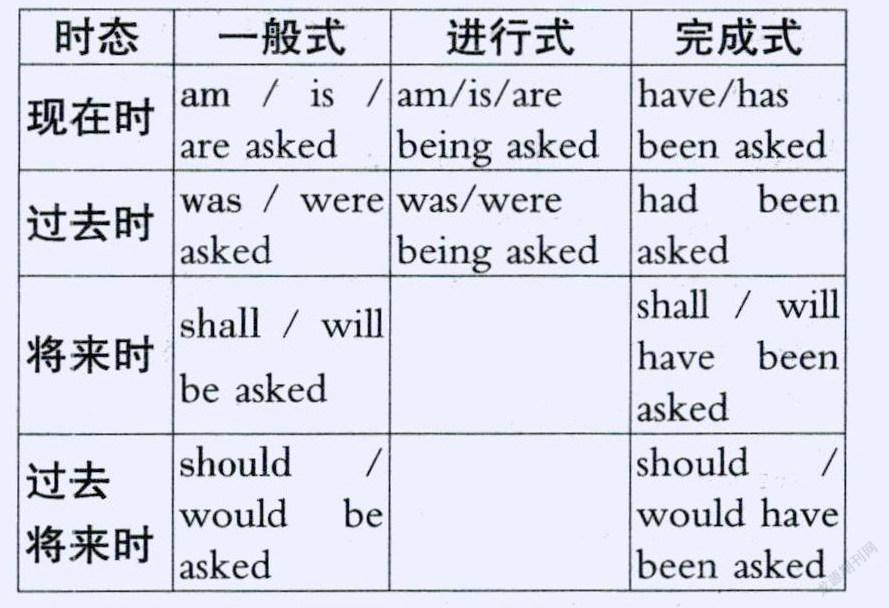动词的被动语态
2020-09-10杜问为
杜问为

一、不同时态的被动语态
[时态 一般式 进行式 完成式 现在时 am / is / are asked am/is/are being asked have/has been asked 过去时 was / were asked was/were being asked had been asked 将来时 shall / will be asked shall / will have been asked 过去
将来时 should / would be asked should / would have been asked ]
注意:
被动语态的否定式是在第一个助动词或情态动词后加not,短语动词的被动语态不可漏掉其中的介词和副词。例如:
Trees should not be planted in summer.
The boy was made fun of by his classmates.
二、被動语态的用法
在英语中,被动语态通常适合在下列场合适用:
1. 当我们不知道或没有必要说出动作的执行者是谁时。例如:
Those pyramids were built around 400 BC. 那些金字塔修建于公元前400年左右。
Visitors have been told many times not to touch the exhibits. 参观者被多次告诫不要触摸展品。
2. 为了强调或侧重动作的承受者,而不强调动作的执行者时。例如:
The suggestion was made by Mr. Hill. 这个建议是希尔先生提出的。
Such things are only eaten by animals. 这样的东西只有动物才吃。
3. 当出于礼貌等方面的原因不宜说出动作的执行者时。例如:
Books in the reference library must not be taken out of the room. 资料室的图书不得带出室外。
If books are not renewed or not returned on time to the library before they are due, a fine must be paid in accordance with the regulations. 如果不办理续借或按时将图书归还图书馆,就得按规定罚款。
4. 在并列句和复合句中,为了避免换主语,使句子显得紧凑、简练,后面的分句(从句)可根据意义的需要使用被动语态。例如:
The picture was painted by a very good friend of mine whom I had not seen for years. 这张画是我的一位多年不见的好友画的。
Mr. Smith came in and was immediately surrounded by his students. 史密斯先生一进来就被他的学生围住了。
5. 有些句子习惯上使用被动语态。例如:
Karl Marx was born on May 5th, 1818 in Germany. 卡儿·马克思1818年5月5日出生在德国。
It is said that he knows some very influential people. 据说他认识一些非常有影响的人物。
三、主动语态和被动语态之间的转换
主动语态转换为被动语态,根据句子的结构,可分为下列几种情况:
1. “主语+谓语+宾语”结构的句子转换为被动语态时,先将主动结构中的宾语变为被动语态的主语(宾语如为人称代词,须将宾格变为主格);然后将主动结构的谓语动词变为被动形式;最后将主动语态的主语变为被动语态by的宾语(如果为代词,主格须变为宾格)。by 短语如无必要指出时,可省略。例如:
They teach English in their school. →
English is taught (by them) in their school.
The man killed the bird with a stone yesterday. →
The bird was killed with a stone by the man yesterday.
2. “主语+谓语+间接宾语+直接宾语”结构的句子变为被动语态时,常常把前面那个指人的间接宾语用作被动语态的主语,也可把后面那个指物的直接宾语用作主语,但此时须在间接宾语前加上介词to或for。例如:
I gave her a book as a birthday present. →
She was given a book as a birthday present by me.
A book was given to her as a birthday present by me.
My father bought me an English-Chinese dictionary. →
I was bought an English-Chinese dictionary by my father.
An English-Chinese dictionary was bought for me by my father.
3. “主语+谓语+宾语+宾语补足语”结构的句子变为被动语态时,只将主动语态的宾语变为被动语态的主语,谓语动词变为被动语态,宾语补足语相应地变为主语补足语。例如:
You must keep this room clean and tidy. →
This room must be kept clean and tidy.
The teacher told him to be quiet. →
He was told to be quiet.
在主动语态中,感官动词see, watch, notice, observe, hear等和使役动词make等后,要用不带to的不定式做宾语补足语。但当这些动词用于被动语态时,不定式作主语补足语时,不定式前必须带to。例如:
I heard her sing the English song yesterday. →
She was heard to sing the English song yesterday.
We saw him go out. →
He was seen to go out.
四、主動形式表示被动意义
1. 某些连系动词(如look, sound, smell, feel, taste, prove等)要用主动表示被动,因为连系动词为不及物动词,它们没有被动语态形式。例如:
My advice proved to be wrong. 我的意见证实是错的。
2. 当open, shut, lock, move等用作不及物动词且表示主语的某种属性时,通常用主动形式表示被动意义。例如:
The window won t lock. 这窗户锁不住。
注意:该用法的不及物动词通常与can t, won t 等连用,注意它与用被动语态含义不同。例如:
The window won t shut. 这窗户关不上。(说明主语的属性:窗户有问题了)
The window won t be shut. 这窗户不用关上。(窗户本身没问题,只是不用关上)
3. 当read, wash, clean, cook, cut, wear, carry等用作不及物动词且表示主语的某种属性时,通常要用主动形式表示被动意义。例如:
This shirt will wear very long. 这衬衫可以穿很久。
注意:该用法通常与well, easily, slowly, quickly等副词连用,并且在作以上意思解时通常不宜直接使用被动语态形式。
4. 不定式to blame, to let用作表语时,通常要用主动形式表示被动意义。例如:
Who is to blame? 该怪谁呢?
The house is to let. 此屋出租。
5. 某些“be+形容词+to do”结构中的不定式通常要用主动形式表示被动意义。例如:
The poem is not easy to understand. 这首诗不容易理解。
6. be worth后的动名词要用主动形式表示被动意义。例如:
This might be worth thinking about. 这可能值得考虑。
7. 在need, want, require等少数表示“需要”的动词后的动名词用主动形式表示被动意义。例如:
The plants want watering every day. 这些花草得天天浇水。
He needs operating on at once. 他需要马上做手术。
注意:以上结构中的动名词改用不定式则要用被动形式表示被动意义。例如:
This sentence needs explaining / to be explained. 这个句子需要解释。
五、被动语态和系表结构的区别
“be+过去分词”结构既属于被动结构,也可能是系表结构。二者主要区别是:被动结构强调动作,重点说明动作是由谁完成的以及怎样完成的,而系表结构通常表示主语的特征或所处的状态。例如:
When we arrived, the door was locked. 我们到达时,门是锁着的。(系表结构)
We didn t know when the door was locked. 我们不知道门是什么时候被锁上的。(被动语态)
The cup is broken. 这个杯子是破的。(系表结构)
The cup was broken by my little brother yesterday. 这个杯子是我弟弟昨天打破的。(被动结构)
